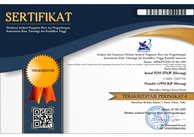| ARTICLE TEMPLATE |
Author Guidelines
Statement of publication ethics and publication malpractice
Journal Publication Ethics Guidelines
(These guidelines are based on Elsevier policy)
Writer's Duties
(These guidelines are based on Elsevier policy)
Reporting standards
Data access and retention
Authors may be asked to provide raw data in connection with a paper for editorial review, and should be prepared to provide public access to such data, if possible, and should in any event be prepared to retain such data for a reasonable time after publication.
Originality and plagiarism
Multiple, redundant or concurrent publication
Source acknowledgment
Paper writing
Human or animal hazards and subjects
Disclosure and conflicts of interest
Fundamental errors in published work
Duties of the Editorial Board
(These guidelines are based on Elsevier policy and the COPE Best Practices Guidelines for Journal Editors)
Publication decisions
Fair play
Confidentiality
Editors and any editorial staff should not disclose any information about a submitted manuscript to anyone other than the corresponding author, reviewers, potential reviewers, other editorial advisors, and the publisher, as appropriate.
Disclosure and conflicts of interest
Involvement and cooperation in investigations




.png)









